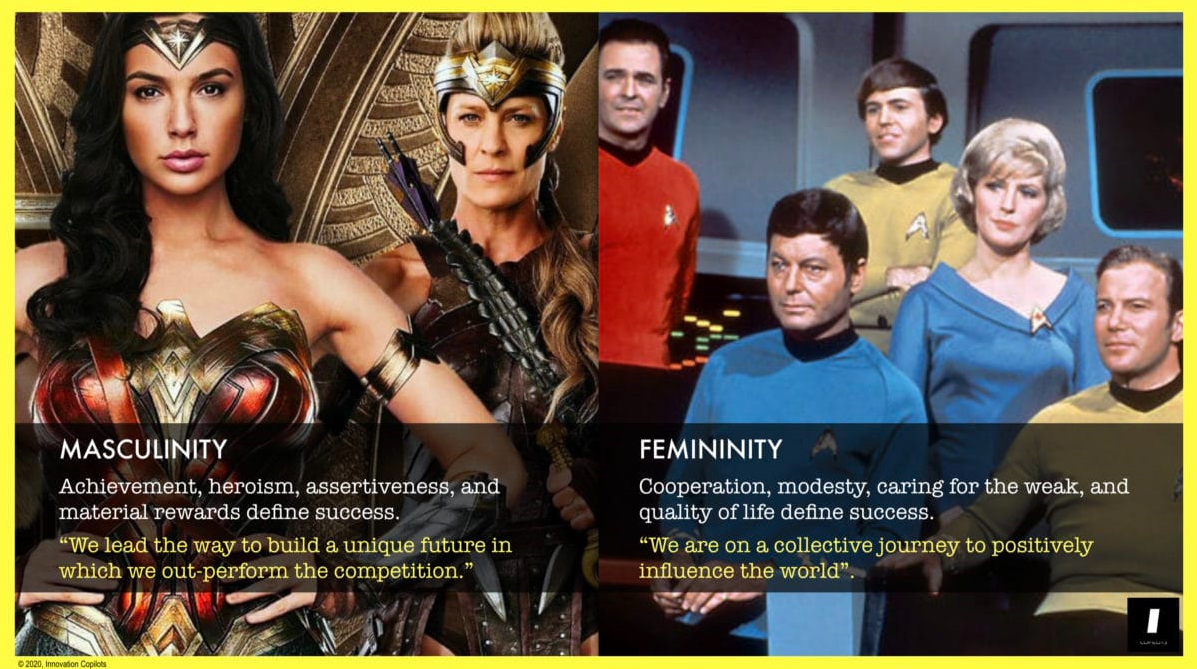Stephanie Mitrano: Feminine Values in Uncertain Times
This quarter's Expert is Dr Stephanie Mitrano-Méda, Co-Founder of Innovation Co-Pilots, and dedicated former PWN volunteer (President, PWN Marseille, Co-VP Mentoring, PWN Global). Stephanie recently delivered a great webinar as part of the PWN Global Leadership and Development Series, on the topic of "Growing Through Challenges". If you're a PWN Member, you can listen to the playback of this great session, in our Webinar Library, where she walked us through a practical exercise of guided introspection.
 In this article, Stephanie shares with us her thoughts on how feminine values are critical in uncertain times. In this article, Stephanie shares with us her thoughts on how feminine values are critical in uncertain times.
"Early 2020, I was writing about how feminine values in your corporate culture were key for innovation; little did I know then how important that message was going to be, especially as we are going through the COVID/Post COVID crisis. In this article, I am sharing why paying attention to and encouraging the expression of feminine values in your organisation. This article is not about gender equality, this is another issue that each organisation needs to figure out. Here the point is to explore with you how increasing the ratio of feminine values in your corporate culture can enhance your survival chances in uncertain times.
In view of recent discussions with friends, colleagues, clients and Linkedin connections on the subject of this article, I feel I need to clarify something at the onset: There are 2 problems to solve
- There is a gender gap that needs to be filled. Not focusing on that is a non-starter. It is about equality of treatment, pay, and access to high positions in organisations, or to anything anyone wishes to access professionally.
- There is in our current society a majority of organisations whose cultures are strongly “masculine”. Because they are lead by men of course, but also because masculine values were previously very efficient in previous contexts. And this is the main point of this article. In the new context of high uncertainty, what matters in the end is that feminine values, expressed through practices such as mentoring, learning communities, portfolio R&D… add more values than the masculine values of « go get them ». Hence, if you want to survive, feminine values need to be encouraged in organisations’ cultures.
To summarize :
a) The social discussion is: no matter what, more women are needed to live in a fair society;
b) The strategic discussion is: Right now and for the foreseeable future, companies with more feminine values will navigate market turmoils with much more resilience. Both (a) and (b) are different issues, but they end up working in synergy.
Several key points need to be understood, though:
- The expression of feminine values is not exclusive to women and can be encouraged in men.
- Women who have managed to reach the top in masculine cultures have usually done so by exhibiting masculine values.
- So putting a quota of women in senior exec roles and keeping the masculine values in the culture will solve maybe problem n°1, but will not necessarily solve problem n°2.
- However, having a critical mass of people (men and women) exhibiting feminine values in an organisation, will update the organisation’s culture, and solve problem n°2. And it will also naturally solve n°1, just because of the nature of feminine values: welcoming, cooperation, and quality of life.
- This will also benefit men, by the way.
Many programs to help women rise to the top have taken the approach of teaching women to navigate in a masculine culture, and we need that since a majority of cultures are masculine. However, I believe there is another complementary approach that consists in changing the culture so that women can truly shine without needing to overly exhibit masculine traits.
This is both about balancing increased women representation all across the board and increasing feminine values in organizations to build up anti-fragility for the years ahead of us.
Why masculine values have been an asset for so long?
As long as our context was challenging but somehow predictable, the masculine “hero” values were highly valuable. Slow and stable evolution of society and technology, with clear visibility of the competition and foreseeable market outcomes with known risks and opportunities (with the famous SWOT analysis) meant that:
- The “hero” and his team could focus on defining and implementing one vision, its business plan, and operational goals. What counted was beating the competition in a zero-sum game where you want to be fast and sharp;
- Calculating and mitigating risks for each project or product was possible, and a pipeline (linear) approach to R&D and innovation was producing results;
- The focused awareness of masculine cultures served the business goals by identifying the quick wins and short-term opportunities.
In a market with predictable challenges, it was also fairly easy to define your needs for talents and skills, so:
- A masculine culture could hire people based on previous performances and try to win a war on talent by offering attractive rewards;
- Employees could be trained for incremental development of the “right” skills;
- The best performers could be promoted higher in the hierarchy.
And with goals consecutively challenging but easy to define, negative emotions were triggered by inadequacy with expected performance. Which in turn pushed for:
- Only keeping the best performers to stay ahead of the competition (survival of the fittest);
- Showing your engagement by pushing through the pain and achieving more than you thought possible (crunch time culture).
Lastly, with organisations that were relying on long-term forecasts and clear-cut ROI projections:
- It was easy to motivate and encourage masculine behaviours with rewards over achievements and performance.
In these pre-Covid times, the feminine “tribe” values were perceived as limited in strategic value. They would have some obvious roles to play in support functions to enhance and prolong the “masculine” energetic performance and to care for the under-performers (or the wounded).

Why are feminine values now critical to thriving in uncertainty?
But times have drastically changed. Now that we have moved to a market sustaining high uncertainties all across the board, masculine values do not add as much value and can often even be dangerously counter-productive.
In a fast-evolving context with unknown risks & opportunities:
- The masculine vision-driven, goal-oriented mindset engenders rigidity and serious blindspots about the real competition. The level of unknowns either makes these organisations overly prudent to freeze or boldly rush in one direction regardless of costs.
- While the feminine focus on the problem at hand and thinking in terms of scenarios and backup plans allows for prudent exploration of new terrains.
As the needs for future skills and the kind of resources to introduce in the organisation are becoming unclear:
- The levels of incompetence are quickly reached in a masculine culture as trainings keep on following the late playbook. And with limited levels of collaboration, the pockets of up-to-date knowledge and experience don’t cross over the silos.
- While feminine values foster strategies such as learning communities, the development of new skills based on personal interest, teaching each other, sharing experience, mentoring, and learning from mistakes… They end up building more diverse skill sets and mindsets, which in turn create organizational resilience.
Markets in turmoil with high uncertainty also trigger specific negative emotions connected to the sheer difficulties of understanding what’s going on and adapting to it. In this context:
- Masculine values drive to a high level of burnout and raise the toxicity level of the culture;
- Feminine cultures have an easier time acknowledging the pains of transformation and thus create a supportive environment to go through the crisis without “shame” or embarrassment.
In term of process and planning, the unpredictability of future ROIs mean that:
- Masculine culture keeping on trying to paint precise and timely targets will nurture frustration and demotivation;
- While organisations driven by more feminine values of patience and a sense of wonder will have easier times dealing with unpredictable timings and results.
Toward a more balanced culture…
I trust you understand that my point is NOT that masculine values are bad and feminine are good. But rather, in our new context, balancing your culture with more feminine values is not just “nice” but critical for your survival.
So I leave you with a homemade poem inspired by the masculine hero's journey:
Not quite the hero’s journey anymore
Uncertainty is the hero’s despair,
Assertiveness leads efficiently on the road to nowhere,
The expected treasure is nowhere to be found.
While…
The tribe gathers strength,
The many voices open new paths,
The unexpected fruits are a delight.
To find out more about Stephanie and her activities, you can visit the Innovation Co-Pilots website.
Author: Stephanie Mitrano-Méda, Co-Founder, Innovation Co-Pilots
Byline by: Rebecca Fountain, Marketing Consultant, PWN Global
Date: September 2022 |